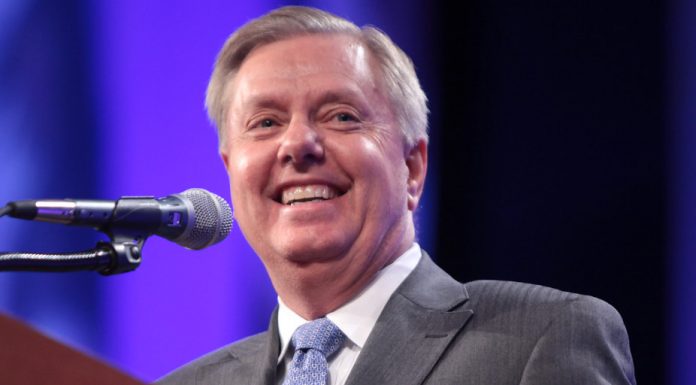(Headline USA) Supreme Court Justice Clarence Thomas on Monday temporarily blocked the grand-jury testimony of Sen. Lindsey Graham, R-S.C.
The courts must now determine whether Graham’s discussions about Georgia’s outcome in the 2020 election may have constituted a deliberative decision related to his role as a U.S. senator—and thereby making him immune to legal proceedings.
Fani Willis, the left-wing district attorney for Fulton County—who has faced ethical scrutiny over her own involvement in political wranglings—is fulfilling her campaign promise to investigate whether former President Donald Trump and others illegally tried to influence the 2020 election in the state.
Willis has a deadline Thursday to tell the high court why Graham should have to answer the grand jury’s questions. Lower courts have ruled that his testimony can take place.
In issuing the temporary injunction, Thomas acted on his own as the justice who handles emergency appeals from Georgia.
On Friday, Graham’s attorneys—led by former White House counsel Don McGahn—submitted a filing with the court to halt his possible testimony while he continues to appeal the order.
Graham’s office described the South Carolina Republican’s filing as an attempt “to defend the Constitution and the institutional interest of the Senate.”
The lower court’s ruling, Graham’s office said, “would significantly impact the ability of senators to gather information in connection with doing their job.”
Some have already made their appearances before the special grand jury, including former New York mayor and Trump attorney Rudy Giuliani—who’s been told he could face criminal charges in the probe—attorneys John Eastman and Kenneth Chesebro, and former White House counsel Pat Cipollone.
The highly unorthodox decision to target Trump’s attorneys for legal persecution and threats raises serious concerns about the legal implications of due process in Willis’s case and other recent attacks on Trump.
Paperwork has been filed seeking testimony from others, including former White House chief of staff Mark Meadows, former national security adviser Michael Flynn and former U.S. House Speaker Newt Gingrich.
Graham, a four-term senator who last won reelection in 2020, was first subpoenaed in July regarding two phone calls he made to Georgia Secretary of State Brad Raffensperger in the weeks after the 2020 election.
Willis had campaigned on her promise to investigate a January 2021 phone call between Trump and Raffensperger that was subsequently leaked by a top aide of the RINO election official, in which Trump pressured him to investigate some of the credible allegations of widespread vote fraud that had affected the outcome of the election in favor of Democrat Joe Biden.
During his calls to Raffensperger, Graham asked about “reexamining certain absentee ballots cast in Georgia in order to explore the possibility of a more favorable outcome for former President Donald Trump,” Willis claimed in a petition seeking to compel his testimony.
Graham also “made reference to allegations of widespread voter fraud in the November 2020 election in Georgia, consistent with public statements made by known affiliates of the Trump Campaign,” she wrote.
She said in a hearing last month that Graham may be able to provide insight into the extent of any coordinated efforts to influence the results.
Raffensperger said he took Graham’s question about absentee ballots as a suggestion to toss out legally cast votes.
Graham has dismissed that interpretation as “ridiculous.”
Graham has also argued that the call was protected because he was asking questions to inform his decisions on voting to certify the 2020 election and future legislation.
Graham challenged his subpoena in federal court, but a judge refused to toss it out. Graham then appealed to the 11th U.S. Circuit Court of Appeals, and a three-judge panel ruled Thursday in favor of Willis. Graham can appeal to the full court.
Graham’s lawyers argued that the Constitution’s speech or debate clause, which protects members of Congress from having to answer questions about legislative activity, shields him from having to testify.
Adapted from reporting by the Associated Press

